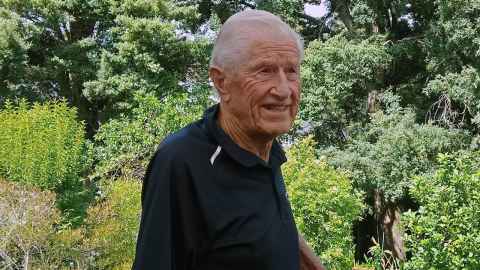Allan Martin, aged 97 and training for gold again
24 May 2024
Golden Graduate Allan Martin has enjoyed a hugely varied and successful career. He tells Megan Fowlie what continues to drive him, well into his 90s.

Allan Martin farewells me from his Warkworth home with, “Do a PhD, it will be liberating!”
At 97 years, Dr Allan Martin, OBE, husband, father, farmer, pilot, ferry skipper, Doctor of Philosophy, television broadcast pioneer, CEO, director, track and field athlete, and newshound, is a strong advocate for lifelong learning.
Allan recalls the 1970s and 80s, working toward his Education PhD and, before that, teaching and examining for the International English Language Testing System. From a populist viewpoint, Allan came to tertiary education late – although it’s nearly 20 years since his doctorate was conferred in 2006. His thesis was entitled ‘Older adulthood, education and social change’. He was 80, the oldest doctoral graduate that year.
“The idea that tertiary education stops at the age of 25 when you have 50, 60, 70 more years of living ahead of you is ridiculous – and a tragedy that governments haven’t provided for, and universities haven’t pushed for.
“Late in life, mental acuity becomes more important than the physical. I am a great believer in physical fitness – but the demand to keep going on springs from the brain.”
The eight-time World Masters Games gold medallist, who has another 18 golds from the New Zealand-Australia Games, is training again. This time for the Pan-American Masters in Ohio in July.
“Assuming I live long enough!” he laughs. He’ll be 98.
Allan competes in the 100m, 200m, 400m and now the javelin and discus. “I’ve never done discus before. My granddaughter suggested I switch from long jump.”
The idea that tertiary education stops at the age of 25 ... is ridiculous.
In the 1930s, growing up on a gorse-strewn farm outside Whangārei, with apple trees, garden vegetables and fresh milk, Allan believes the Martin family weathered the Great Depression well. He attended a one-room school, then boarded at Carruth House at Whangārei Boys’ High School until the Second World War. Labour was short and with the untimely death of his father and, later, his older RAF bomber brother missing in action and then a prisoner of war, Allan, aged 15, ran the family dairy farm.
His recollections are of teenage independence: a car, a driver’s licence, a job and “getting up to all the things teenage boys got up to … and broadcasting, yes!”
In 1987, Allan received an OBE for his services to New Zealand broadcasting. It was a career that began when an old high school and army mate, Bob Irvine, recruited Allan as a local radio announcer in between milkings.
Radio took him to Australia, then to Mozambique. He met and married Joy in the grandiose tree-lined white avenues of the capital Lourenço Marques, now Maputo. Next, on to the UK producing London’s first commercial television channel.
Enticed back to New Zealand, he worked in daily news alongside Alan Morris at the NZBC, becoming chief producer and spearheading local shows Town and Around and Compass. By the late 1970s, coaxed across the Tasman, he received a Logie Award for current affairs production and became head of ABC public affairs television.
It is his time as director-general of TVNZ with which he is most pleased.
“A pinnacle was when the top ten programmes were homegrown.
“Public service is vital to the country, a great means of expression, debate, conversation. It is important in developing a certain standard and stability, a narrative, if you like.”
Allan is now creative director of Ideaschannel.net, working with Dr Mike Minehan, a former colleague, on “a selection of what we think are the best news services in the world, the best science, arts, free education, opinion and ideas”.
He suggests people are hankering for context, searching for stability of ideas and leadership.
“Thinking about this century, there’s been incredible change – and, for the next generation, with AI here, I think there will be such very great change and challenge on the horizon.”
Golden Graduates are those who graduated from the University 50 or more years ago, along with graduates aged 70 or over.
This story first appeared in the Autumn 2024 edition of Ingenio.